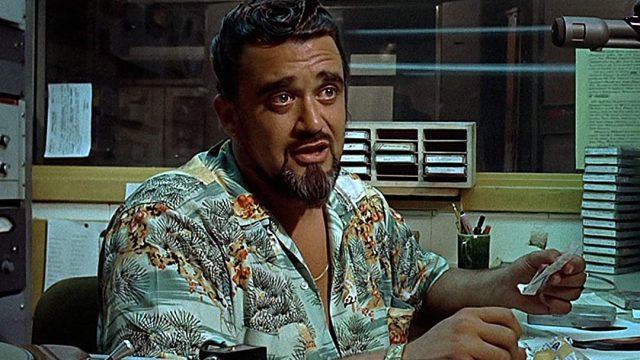It would have been late spring, 1986. Probably somewhere I still have the certificate with the exact day on it. My family waited patiently all night outside the Griffith Observatory, in a very long line. Finally, we made our way to the front and peered through the telescope. There, fuzzy but distinctly visible, was Comet Halley. That scrap of history, seen every 76 years. Associated with the Battle of Hastings, Atilla the Hun, and Mark Twain. And, for me, Wolfman Jack. We’d just gotten a new-to-us car, and I remember sitting in it—on the way there or the way back I cannot now say—listening to Wolfman Jack while participating in what might well be a once in a lifetime event.
He was born with the prosaic name Robert Smith. His father worked for Financial World. When his parents divorced, his father bought him a radio, and young Robert was hooked. The boy fell in love with R&B—and the disc jockeys. His first stop was WYOU, now a Christian station; he actually stayed through two of its incarnations. When it played R&B, he was Daddy Jules. The station change format to “beautiful music,” a way of saying “easy listening,” and he became Robert Gordon and Music in Good Taste. This is around the time he married Lucy Lamb, whose maiden name would be very funny soon.
In 1962, he moved to Shreveport, Louisiana, where he became station manager and morning disc jockey. This is where he took on the Wolfman Jack persona. He loved horror movies. Alan Freed had originally called himself “Moondog” on the radio, and he borrowed bits of that, and of course some of the stage persona of Howlin’ Wolf. Combining the three created a persona who would live longer than the actual Robert Smith would; apparently fans still trade recordings. His success became assured once he moved south of the border and started broadcasting in “border blaster” Mexican radio, where he could be heard as far away as the Soviet Union.
Wolfman Jack, from all I know, seems to have been a pretty decent guy with an intense love of radio. I mean, the man was given a percentage—a very small one, but a percentage—in American Graffiti. By the time he died, that was definitely “you don’t need to work” money, but he died shortly after recording his final show. It doesn’t take much reading between the lines of his biography to discover a man who was passionate about radio and broadcasting and really enjoyed what he was doing.
In the end, his American Graffiti portrayal may be closer to reality than people know. Richard Dreyfuss spends the whole night pursuing the blonde, and who he finds is a guy in a radio station eating popsicles before they melt. For a while, Wolfman Jack deliberately cultivated a racially ambiguous persona, which in his early radio days was seen as more threatening. He played with how much he genuinely seemed like a werewolf in public appearances. But in the long run, he was just a guy who loved his job.
Keep my family in popsicles by supporting my Patreon or Ko-fi!

